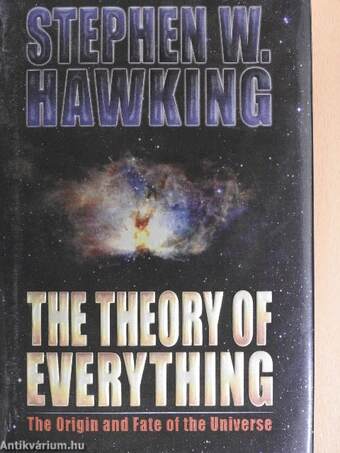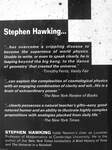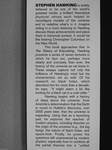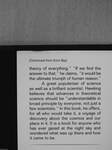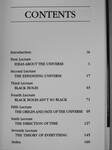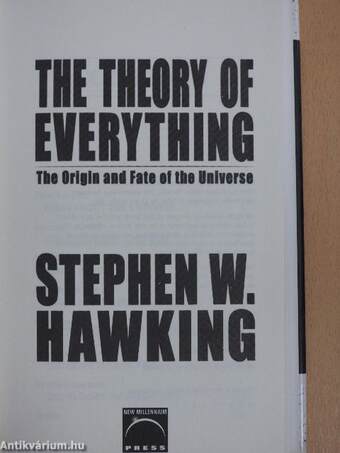1.066.283
kiadvánnyal nyújtjuk Magyarország legnagyobb antikvár könyv-kínálatát

VISSZA
A TETEJÉRE
JAVASLATOKÉszre-
vételek
The Theory of Everything
The Origin and Fate of the Universe
| Kiadó: | New Millennium Press |
|---|---|
| Kiadás helye: | Beverly Hills |
| Kiadás éve: | |
| Kötés típusa: | Fűzött keménykötés |
| Oldalszám: | 176 oldal |
| Sorozatcím: | |
| Kötetszám: | |
| Nyelv: | Angol |
| Méret: | 21 cm x 14 cm |
| ISBN: | 1-893224-54-6 |
naponta értesítjük a beérkező friss
kiadványokról
naponta értesítjük a beérkező friss
kiadványokról
Előszó
TovábbFülszöveg
Stephen Hawking
" has overcome a crippling disease to become the supernova of world physics. Unable to write, or even to speak clearly, he is leaping beyond the big bang, to the dance of geometry' that created the universe."
-Timothy Ferris, Vanity Fair
" can explain the complexities of cosmologicalphysics with an engaging combination of clarity and wit His is a brain of extraordinary power "
-The New Yorl< Review of Bool<s
" clearly possesses a natural teacher's gifts—easy, good-natured humor and an ability to illustrate highly complex propositions with analogies plucked from daily life."
-The New Yorl< Times
STEPHEN HAWKING holds Newton's chair as Lucasian Professor of Mathematics at Cambridge University. He is the author of the New York Times bestsellers A Brief History of Time and The Universe in a Nutshell.
STEPHEN HAWKING is widely believed to be one of the world's greatest minds: a brilliant theoretical physicist whose work helped to reconfigure models of the... Tovább
Fülszöveg
Stephen Hawking
" has overcome a crippling disease to become the supernova of world physics. Unable to write, or even to speak clearly, he is leaping beyond the big bang, to the dance of geometry' that created the universe."
-Timothy Ferris, Vanity Fair
" can explain the complexities of cosmologicalphysics with an engaging combination of clarity and wit His is a brain of extraordinary power "
-The New Yorl< Review of Bool<s
" clearly possesses a natural teacher's gifts—easy, good-natured humor and an ability to illustrate highly complex propositions with analogies plucked from daily life."
-The New Yorl< Times
STEPHEN HAWKING holds Newton's chair as Lucasian Professor of Mathematics at Cambridge University. He is the author of the New York Times bestsellers A Brief History of Time and The Universe in a Nutshell.
STEPHEN HAWKING is widely believed to be one of the world's greatest minds: a brilliant theoretical physicist whose work helped to reconfigure models of the universe and to redefine what's in it. Imagine sitting in a room listening to Hawking discuss these achievements and place them in historical context. It would be like hearing Christopher Columbus on the New World.
This book approaches that. In The Theory of Everything, Hawking presents a series of seven lectures in which he lays out, perhaps more clearly and concisely than ever, the history of the universe as we know it. These essays capture not only the brilliance of Hawking's mind but his characteristic wit as well. Of his research on black holes, which absorbed him for more than a decade, he says, "It might seem a bit like looking for a black cat in a coal cellar."
Hawking begins with a history of ideas about the universe, from Aristotle's determination that the Earth is round to Hubble's discovery, over 2000 years later, that the universe is expanding. Using that as a launching pad, he explores the reaches of modern physics, including theories on the origin of the universe (e.g., the big bang), the nature of black holes, and space-time. Finally, he poses the questions left unanswered by modern physics, especially how to combine all the partial theories into a "unified
.iMiA'feifiiiyil:'!.^^
(Continued from front flap)
theory of everything." "If we find the answer to that," he claims, "it would be the ultimate triumph of human reason."
A great popularizer of science as well as a brilliant scientist. Hawking believes that advances in theoretical science should be "understandable in broad principle by everyone, not just a few scientists." In this book, he offers, for all who would take it, a voyage of discovery about the cosmos and our place in it. It is a book for anyone who has ever gazed at the night sky and wondered what was up there and how it came to be. Vissza
Témakörök
- Idegennyelv > Idegennyelvű könyvek > Angol > Természettudományok > Csillagászat
- Idegennyelv > Idegennyelvű könyvek > Angol > Természettudományok > Fizika
- Idegennyelv > Idegennyelvű könyvek > Angol > Természettudományok > Egyéb
- Természettudomány > Fizika > Atom- és magfizika > Kvantumelmélet
- Természettudomány > Fizika > Elméletek és törvények > Relativitás
- Természettudomány > Fizika > Idegennyelvű
- Természettudomány > Fizika > Társtudományok > Egyéb
- Természettudomány > Csillagászat > Idegennyelvű
- Természettudomány > Csillagászat > Társtudományok > Fizika
- Természettudomány > Csillagászat > Világegyetem
- Természettudomány > Általános természettudomány > Érdekességek
- Természettudomány > Általános természettudomány > Kutatások, felfedezések
- Természettudomány > Általános természettudomány > A világ
- Természettudomány > Általános természettudomány > Idegennyelvű > Angol



